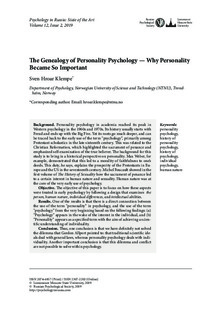| dc.contributor.author | Klempe, Sven Hroar | |
| dc.date.accessioned | 2019-10-02T06:58:48Z | |
| dc.date.available | 2019-10-02T06:58:48Z | |
| dc.date.created | 2019-07-01T14:21:23Z | |
| dc.date.issued | 2019 | |
| dc.identifier.citation | Psychology in Russia: State of the Art. 2019, 12 (2), 58-68. | nb_NO |
| dc.identifier.issn | 2074-6857 | |
| dc.identifier.uri | http://hdl.handle.net/11250/2619696 | |
| dc.description.abstract | Background. Personality psychology in academia reached its peak in Western psychology in the 1960s and 1970s. Its history usually starts with Freud and ends up with the Big Five. Yet its roots go much deeper, and can be traced back to the early use of the term “psychology”, primarily among Protestant scholastics in the late sixteenth century. This was related to the Christian Reformation, which highlighted the sacrament of penance and emphasized self-examination of the true believer. The background for this study is to bring in a historical perspective on personality. Max Weber, for example, demonstrated that this led to a morality of faithfulness to one’s deeds. This duty, he says, explains the prosperity of the Protestants in Europe and the US in the seventeenth century. Michel Foucault showed in the first volume of The History of Sexuality how the sacrament of penance led to a certain interest in human nature and sexuality. Human nature was at the core of the very early use of psychology. Objective. The objective of this paper is to focus on how these aspects were treated in early psychology by following a design that examines the person, human nature, individual differences, and intellectual abilities. Results. One of the results is that there is a direct connection between the use of the term “personality” in psychology, and the use of the term “psychology” from the very beginning based on the following findings: (a) “Psychology” appears in the wake of the interest in the individual, and (b) “Personality” appears as a specified term with the aim of achieving a scientific understanding of individuality. Conclusion. Thus, one conclusion is that we have definitely not solved the dilemma that Gordon Allport pointed to: that traditional scientific ideals deal with general laws, whereas personality psychology deals with individuality. Another important conclusion is that this dilemma and conflict are not possible to solve within psychology. | nb_NO |
| dc.language.iso | eng | nb_NO |
| dc.publisher | M.V. Lomonosov Moscow State University | nb_NO |
| dc.rights | Navngivelse-DelPåSammeVilkår 4.0 Internasjonal | * |
| dc.rights.uri | http://creativecommons.org/licenses/by-sa/4.0/deed.no | * |
| dc.title | The Genealogy of Personality Psychology — Why Personality Became So Important | nb_NO |
| dc.type | Journal article | nb_NO |
| dc.type | Peer reviewed | nb_NO |
| dc.description.version | publishedVersion | nb_NO |
| dc.source.pagenumber | 58-68 | nb_NO |
| dc.source.volume | 12 | nb_NO |
| dc.source.journal | Psychology in Russia: State of the Art | nb_NO |
| dc.source.issue | 2 | nb_NO |
| dc.identifier.doi | 10.11621/pir.2019.0205 | |
| dc.identifier.cristin | 1709061 | |
| dc.description.localcode | Open Access. CC-BY-SA | nb_NO |
| cristin.unitcode | 194,67,40,0 | |
| cristin.unitname | Institutt for psykologi | |
| cristin.ispublished | true | |
| cristin.fulltext | original | |
| cristin.qualitycode | 1 | |

